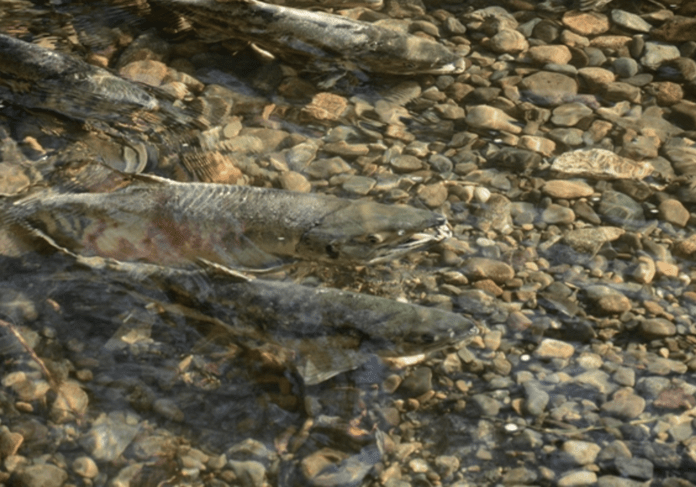After a record setting drought in Victoria, the weekend rains have brought hope for salmon and the Goldstream Park volunteers that observe them annually.
Typically the yearly salmon run begins in mid-October. In 2022, the salmon were forced to have a delayed start because the water levels were too low for them to make their way up the Goldstream River.
Now that the salmon run has begun, the Freeman King Nature House is stocked with volunteers most of the week to teach park visitors about the salmon migration.
Thousands of salmon are expected make their way back to Goldstream to spawn and die, thus completing their lifecycle.
Scientists are still investigating and studying how salmon are able to return to the place they were born to complete their life cycle.
According to the Freeman King Nature House, biologists believe that salmon use their keen sense of smell, vision and memory to navigate and have a small piece of magnetite embedded in their heads that acts as a compass. They are also believed to use the sun, moon and stars for navigation.
Once the Salmon navigate their way to the river they were born, they spend anywhere from a few days to a few weeks at the mouth of the river, which is called the estuary.
The saltwater fish then go through some amazing physiological changes needed to survive the freshwater spawning grounds.
Both sexes of fish change colour entirely, and male salmon grow their iconic hooked jaw during their time in the estuary.
The Nature House says that once the salmon are out of the estuary and in the river, they travel upstream in search of a good spawning ground.
Females look for the ideal gravel spot to shape her nest, sometimes building it less than a meter away from the very nest they hatched from.
While the females prepare the nests, the males fight for dominance. Often the biggest fish with the brightest colours win the right to pass on their genes.
The male will then vibrate his body against the female’s to let her know he is ready. She will then release her eggs into her nest, giving the male a short amount of time to fertilize the eggs. The male has only about 10 to 30 seconds to fertilize before a competing male will step in.
Once the deed is done, the female will cover her eggs and move upstream to make another nest and complete the process again with another male.
The female will typically die shortly after laying her last eggs. Males will live as long as they are able to compete with other males.
This process can last for a few weeks to over a month and has only just begun at Goldstream Park.
By early December, the spawning will be complete and the smell of dead salmon will echo through the forest of Goldstream Park as a reminder of the event.
As for the newly fertilized eggs, they will remain in the river until early March when the hatching begins.
The Freeman King Nature House encourages Greater Victoria residents and visitors alike to come and see the annual salmon run for themselves.
Naturalists are on hand at the Nature House Wednesdays to Sundays from 10 a.m. to 4:30 p.m. to answer questions.
They recommend visitors follow these tips and tricks for visiting the park during the salmon run:
- Try not to wear red, purple, pink or other bright colours that might confuse the salmon
- Carpool if possible as the park has limited parking
- You may find yourself staring at the water for a while, if it’s sunny out polarized sunglasses will help you see what’s happening in the water beneath the sun’s glare
- Polarized camera lenses will help photographers avoid the glare too
- Stay on the trails and try to find a high vantage point to see the action. Kids see best from sitting on top of an adult’s shoulders
- Avoid moving quickly and approach the river quietly from designated areas
- Do not bring dogs. If you must, keep it on leash and away from the river
- Bring binoculars to see the fish better, observe bald eagles and other birds in the area



